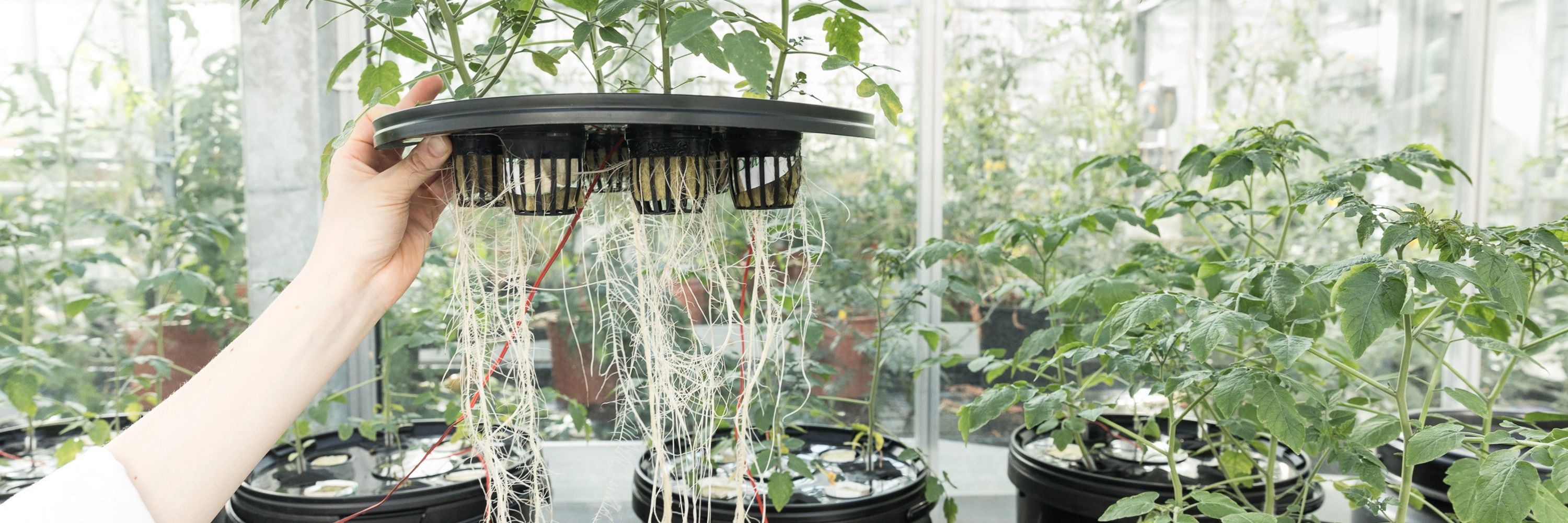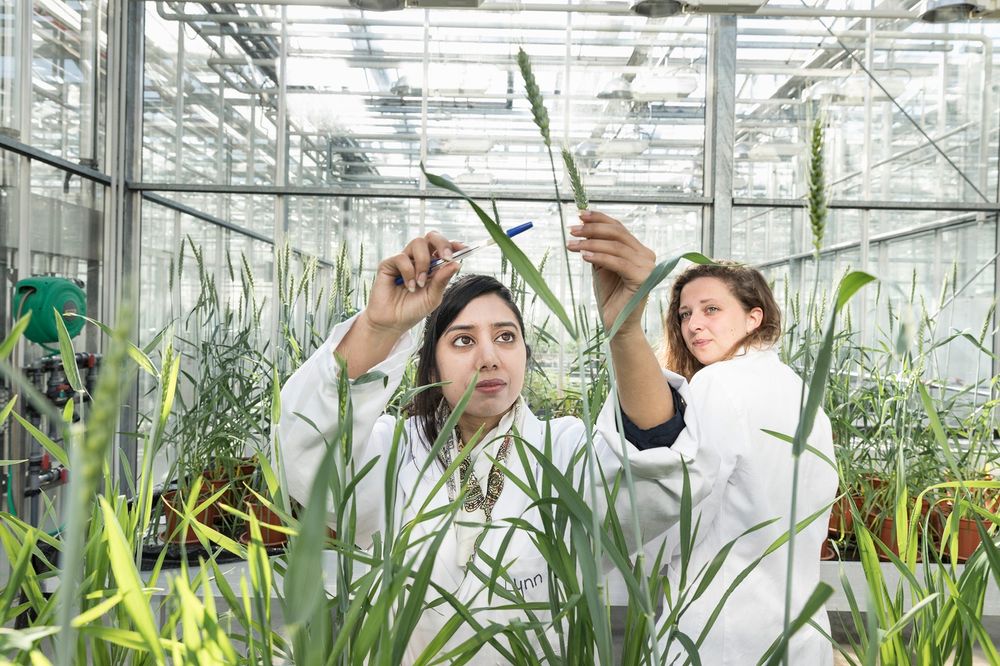
Harro Bouwmeester
@harrobouwmeester.bsky.social
Plant biologist working on belowground chemical communication of plants with other organisms
Proud to have contributed to this beauty from Satoko Yoshida's lab:
Glucosylation of endogenous haustorium-inducing factors underpins kin avoidance in parasitic plants | Science www.science.org/doi/10.1126/...
Glucosylation of endogenous haustorium-inducing factors underpins kin avoidance in parasitic plants | Science www.science.org/doi/10.1126/...

Glucosylation of endogenous haustorium-inducing factors underpins kin avoidance in parasitic plants
Parasitic plants rarely attack themselves, suggesting the existence of a kin-avoidance mechanism. In the root parasitic plant Phtheirospermum japonicum, prehaustorium formation is triggered by host-se...
www.science.org
October 24, 2025 at 1:03 PM
Proud to have contributed to this beauty from Satoko Yoshida's lab:
Glucosylation of endogenous haustorium-inducing factors underpins kin avoidance in parasitic plants | Science www.science.org/doi/10.1126/...
Glucosylation of endogenous haustorium-inducing factors underpins kin avoidance in parasitic plants | Science www.science.org/doi/10.1126/...
Happy to let you know we will be developing a new microbial product to support the transition to a more sustainable agriculture. See the interview with prospective MicroBioLogicals SEO, Roland Berdaguer.
www.linkedin.com/posts/harro-...
www.linkedin.com/posts/harro-...

Our new NWO (Nederlandse Organisatie voor Wetenschappelijk Onderzoek) Faculty of Impact postdoc Roland Berdaguer interviewed for the FoI Newsletter. | Harro Bouwmeester
Our new NWO (Nederlandse Organisatie voor Wetenschappelijk Onderzoek) Faculty of Impact postdoc Roland Berdaguer interviewed for the FoI Newsletter. Roland will work on the development of a microbial...
www.linkedin.com
June 27, 2025 at 11:27 AM
Happy to let you know we will be developing a new microbial product to support the transition to a more sustainable agriculture. See the interview with prospective MicroBioLogicals SEO, Roland Berdaguer.
www.linkedin.com/posts/harro-...
www.linkedin.com/posts/harro-...
Reposted by Harro Bouwmeester
flowers of the parasitic plant *Orobanche uniflora*. It does not produce chlorophyll and takes all its nutrients from other plants

May 29, 2025 at 7:23 PM
flowers of the parasitic plant *Orobanche uniflora*. It does not produce chlorophyll and takes all its nutrients from other plants
Happy to have been able to provide support to Yang Bai and team to pull this off: soil microorganisms affect rice tillering through production of a dipeptidic strigolactone analog.
www.sciencedirect.com/science/arti...
www.sciencedirect.com/science/arti...

Root microbiota regulates tiller number in rice
Rice tillering is an important agronomic trait regulated by plant genetic and environmental factors. However, the role and mechanism of the root micro…
www.sciencedirect.com
April 24, 2025 at 5:51 AM
Happy to have been able to provide support to Yang Bai and team to pull this off: soil microorganisms affect rice tillering through production of a dipeptidic strigolactone analog.
www.sciencedirect.com/science/arti...
www.sciencedirect.com/science/arti...
Happy to see the first results of our collaboration with Pooja Bhatnagar out in the open. Disrupting the chemical communication between host and Striga as a tool to control this parasitic weed scorch.
pubmed.ncbi.nlm.nih.gov/40146284/
pubmed.ncbi.nlm.nih.gov/40146284/

Developing Striga resistance in sorghum by modulating host cues through CRISPR/Cas9 gene editing - PubMed
High transformation and gene editing efficiencies in sorghum-produced, transgene-free SDN1-edited plants exhibit precise mutations, reduced germination stimulants, and enhanced resistance to Striga in...
pubmed.ncbi.nlm.nih.gov
April 22, 2025 at 9:49 AM
Happy to see the first results of our collaboration with Pooja Bhatnagar out in the open. Disrupting the chemical communication between host and Striga as a tool to control this parasitic weed scorch.
pubmed.ncbi.nlm.nih.gov/40146284/
pubmed.ncbi.nlm.nih.gov/40146284/
Proud of former PhD student Nasreldin Mohemed for pulling this off. In loving memory of our friend and mentor Abdul Gabbar Babiker
onlinelibrary.wiley.com/doi/10.1111/...
onlinelibrary.wiley.com/doi/10.1111/...

A role for strigolactones in the genetic variation in tolerance to Striga infection in sorghum
The root parasitic weed Striga hermonthica is a major constraint to cereal production in sub-Saharan Africa. Tolerance to Striga—guaranteeing a reasonable yield despite infection—is potentially a val....
onlinelibrary.wiley.com
April 8, 2025 at 7:32 AM
Proud of former PhD student Nasreldin Mohemed for pulling this off. In loving memory of our friend and mentor Abdul Gabbar Babiker
onlinelibrary.wiley.com/doi/10.1111/...
onlinelibrary.wiley.com/doi/10.1111/...
Reposted by Harro Bouwmeester
New publication: The role of #strigolactone structural diversity in the host specificity and control of #Striga, a major constraint to sub-Saharan #agriculture. #microbiome #fungi #parasiticplants #sorghum #sulfotransferase
https://doi.org/10.1002/ppp3.10549
https://doi.org/10.1002/ppp3.10549
December 2, 2024 at 9:58 PM
New publication: The role of #strigolactone structural diversity in the host specificity and control of #Striga, a major constraint to sub-Saharan #agriculture. #microbiome #fungi #parasiticplants #sorghum #sulfotransferase
https://doi.org/10.1002/ppp3.10549
https://doi.org/10.1002/ppp3.10549
Thrilled to be back in Zürich to give an update on our work on rhizosphwre signalling www.uzh.ch/en/events/ag... and to discuss collaboration with Marcel van der Heijden and team on role of strigolactones in AM fungi colonisation.
Current Events
www.uzh.ch
March 8, 2025 at 6:49 AM
Thrilled to be back in Zürich to give an update on our work on rhizosphwre signalling www.uzh.ch/en/events/ag... and to discuss collaboration with Marcel van der Heijden and team on role of strigolactones in AM fungi colonisation.
Happening tomorrow - see you at 1 pm GMT
For our March IPPS seminar, we will have two speakers studying broomrapes in the Mediterranean: Begoña Pérez Vich from Spain and Amal Boukteb from Tunisia: www.parasiticplants.org/2025/02/marc...
March 4, 2025 at 8:41 PM
I am happy to announce that MiCRop PhD candidate Roland Berdaguer received a Faculty of Impact grant to join us at University of Amsterdam. He will develop microbiological products for a sustainable agriculture, through spin-off company, MicroBioLogicals.
February 26, 2025 at 11:08 AM
I am happy to announce that MiCRop PhD candidate Roland Berdaguer received a Faculty of Impact grant to join us at University of Amsterdam. He will develop microbiological products for a sustainable agriculture, through spin-off company, MicroBioLogicals.
Want to work in the forefront of plant root microbiome research? Join our @UVA Plant Hormone Biology group for a PhD on microbiome host specificity with Kathrin Wippel
werkenbij.uva.nl/en/vacancies...
werkenbij.uva.nl/en/vacancies...

Vacancy — PhD Candidate Microbial Host Preference in Plant Stress Resilience
Are you an early-career researcher with a passion for plant science? Would you like to apply your enthusiasm to a highly relevant project in the field of plant-microbiome interactions? Then we have th...
werkenbij.uva.nl
February 23, 2025 at 7:23 PM
Want to work in the forefront of plant root microbiome research? Join our @UVA Plant Hormone Biology group for a PhD on microbiome host specificity with Kathrin Wippel
werkenbij.uva.nl/en/vacancies...
werkenbij.uva.nl/en/vacancies...
Proud to be among the team publishing this. www.cell.com/the-innovati...
Altering strigolactone exudation in tomato for broomrape resistance.
Altering strigolactone exudation in tomato for broomrape resistance.

Manipulation of a strigolactone transporter in tomato confers resistance to the parasitic weed broomrape
Parasitic weeds of the Orobanchaceae family cause substantial economic losses and
pose significant threats to global agriculture. However, management of such parasitism
is challenging, and very few re...
www.cell.com
February 23, 2025 at 5:41 PM
Proud to be among the team publishing this. www.cell.com/the-innovati...
Altering strigolactone exudation in tomato for broomrape resistance.
Altering strigolactone exudation in tomato for broomrape resistance.
Hi there, welcome on the other side. Hope we can establish an inspiring community here.
February 23, 2025 at 3:54 PM
Hi there, welcome on the other side. Hope we can establish an inspiring community here.







